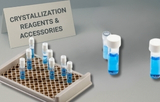Crystallization is a fundamental process in science and industry, used to purify substances, study molecular structures, and produce materials with specific properties. The success of crystallization relies heavily on the reagents and accessories employed to control and optimize crystal growth.
Crystallization Reagents
Crystallization reagents are chemical substances that facilitate the formation of crystals by altering the physical or chemical conditions of a solution. These reagents play a crucial role in promoting nucleation, sustaining crystal growth, and ensuring purity.
- Nucleation: Reagents control the formation of initial crystal nuclei by modulating supersaturation levels.
- Crystal Growth: They sustain growth by maintaining conditions within the metastable zone.
- Purity: Selective crystallization ensures that impurities remain in the solution phase.
Crystallization Accessories
Accessories are tools designed to facilitate precise handling, monitoring, and optimization of crystallization processes. They ensure reproducibility and efficiency in both laboratory and industrial settings.
- Process Control: Enable precise control over environmental conditions such as temperature and humidity.
- Monitoring: Provide real-time insights into crystal formation and growth dynamics.
- Sample Handling: Facilitate efficient setup and maintenance of crystallization experiments.
Applications of Crystallization Reagents and Accessories
- Structural Biology: Producing high-quality crystals for structural analysis.
- Pharmaceuticals: Purifying active pharmaceutical ingredients (APIs) with controlled properties.
- Material Science: Fabricating crystalline materials with precise properties.
- Food Industry: Producing crystalline products through controlled processes.


